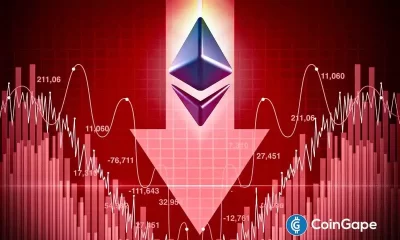Opinion
The Trump Pump: A Road To Capture and Failure
Published
5 months agoon
By
admin


Well the “Trump Pump” seems to be ripping off spectacularly. Everyone is cheering, euphoric, happy, feeling on top of the world. Knock it off. Yes, the number is going up, everyone’s net worth (on paper) is increasing by the hour, but this is not a matter of celebration.
This is Bitcoin entering the gauntlet. These institutions, this administration, these high net worth individuals, they are not your friends. They are not here for the same reasons as people trying to build a monetary network centered around sovereignty and freedom. They are just here to make a buck, and to maintain this disordinate level of influence and control over the world around them.
These people don’t give a shit about self custody being scalable, or privacy being accessible, or Bitcoin doing anything to bring these tools of freedom to the masses. They care about Number Go Up, that is all. If this run really does turn into what it looks like it could, this presents an existential crisis for Bitcoin. All of these people are buying their seats at the table, and those seats come with much more influence than the aggregate of the average person who has been working hard to accumulate bitcoin the last few years.
Bitcoin consensus is dictated by the economic actors actually using it. If Bitcoin becomes a simple financialized asset dominated by the legacy institutions and actors that it was built to free us from, then proportionally to their level of use they decide consensus. The only choice left to us is to convince them, or deviate by forking off on a much less valuable (and therefore less useful) network.
These people dominating the network this early, before the necessary work is done to make this a viable and scalable network, is sprinting down the road towards ossification. Of people being stuck with no viable option except being wealthy already, or picking their choice of trusted third party to interact with the protocol and network. And none of these people will care.
Why would they support protocol upgrades that improve the scalability or privacy of Bitcoin? They make their living, all they know how to do is insert themselves as middlemen between the average person and the asset they want to interact with, making money by rent seeking as that intermediary. What incentive would they have to unseat themselves from that lucrative position?
Bitcoiners should not get complacent simply because existing holders are watching their net worth increase during this bull market. There is a lot more to do, otherwise Bitcoin will not live up to a fraction of its potential as a tool to spread real freedom.
So what do you value more? Getting rich or helping spread a tool to liberate people who are currently subject to the whims of tyrants and rent seekers?
This article is a Take. Opinions expressed are entirely the author’s and do not necessarily reflect those of BTC Inc or Bitcoin Magazine.
Source link
You may like


Dogecoin Follows This Blueprint, Says Crypto Analyst


Metaplanet Buys Additional ¥3.8 Billion Worth Of Bitcoin


Crypto Trader Unveils Massive Bitcoin Price Target Amid Extended BTC Bull Market – Here’s His Outlook


Is it possible to make $1m with crypto?


Japan’s Metaplanet Buys Another $26M in Bitcoin Amid Tariff Market Uncertainty


Has Ethereum Price Bottomed? 3 Reason Why ETH Could Crash More
Opinion
Crypto’s Biggest Barrier to Adoption? It’s Not Regulation — It’s UX
Published
1 day agoon
April 13, 2025By
admin

As the crypto industry matures, much of the focus remains on regulation, custody, and scalability. But in 2025, the biggest barrier to adoption isn’t policy — it’s user experience. Crypto’s interfaces are still too complex for everyday users. From managing seed phrases to deciphering blockchain transactions, onboarding feels more like navigating a maze than joining a financial revolution. Wallets remain fragmented, unintuitive, and risky.
To reach mainstream adoption, the industry must prioritize usability — making wallets and financial tools more accessible — without compromising the core principles of decentralization. Until then, poor UX will continue to hold crypto back.
Vitalik Buterin’s Call for Account Abstraction
Ethereum co-founder Vitalik Buterin has been one of the most vocal proponents for improving the usability of crypto wallets. His critique centers on the fact that wallets are designed with developers, not end-users, in mind. While technical innovations in blockchain security are advancing, wallets often remain rooted in outdated models that prioritize control over ease of use, leaving the average user overwhelmed and vulnerable to mistakes.
Buterin’s proposed solution (EIP-7702), account abstraction, is a breakthrough concept that could reshape how we interact with crypto assets. Account abstraction allows smart contract functionality to be applied to externally owned accounts (EOAs), the most common type of wallet used in crypto. This would enable more intuitive and flexible security mechanisms, such as social recovery, multi-signature support, and customizable authentication methods, without compromising decentralization or self-custody.
At its core, account abstraction decouples the traditional reliance on a single private key for securing assets, creating the potential for much more user-friendly experiences. Rather than expecting users to memorize long and complex seed phrases or manage multi-step transactions, account abstraction can allow for recovery options, automatic transaction approvals, and even the option to delegate certain actions to trusted contacts — without ever losing ownership of the private keys.
A Call for Human-Centered Design in Crypto
Crypto’s UX problem isn’t just about cleaner interfaces — it’s about rethinking design to prioritize human needs. Historically, tools have been built for power users comfortable with seed phrases and command-line interfaces. But for mass adoption, crypto must serve people who’ve never held a private key.
This is where human-centered design becomes essential. Developers must build wallets and tools that are intuitive, context-aware, and focused on user safety. The shift must move from catering to the technically inclined to empowering everyday users who are new to crypto. To succeed, wallets need to embrace the following core design principles:
- Smart Defaults and Progressive Onboarding: Users should not need to dive into settings or security configurations to get started. Newcomers should be able to start using a wallet with minimal friction, but with built-in guidance and the option to unlock more advanced features as they become more familiar with the space. By providing clear default security settings — such as social recovery options and automatic transaction limits — wallets can offer both ease of use and security from the outset.
- Clear, Intuitive Signing Processes: Transaction signing should be straightforward, with clear explanations of what users are agreeing to. If a user is about to approve a transaction that could drain their wallet, this should be prominently displayed in plain language, not buried under hexadecimal codes or complex jargon. Reducing ambiguity in these interactions will help mitigate the risks of scams and human error.
- Social and Multi-party Recovery Systems: Relying solely on seed phrases as a recovery method is an outdated and risky practice. Instead, wallets should adopt social recovery systems, where users can designate trusted parties to help restore access to their wallet in case of lost keys. This approach not only makes wallets more resilient but also adds a layer of user trust and security.
- Built-In Education and Contextual Help: To truly empower users, crypto wallets need to include educational tools directly within the interface. Contextual prompts, tooltips, and interactive tutorials can help users understand the significance of each action they take, without overwhelming them with dense technical documentation.
- Automation with Control: Features like auto-payment for transaction fees or the ability to batch transactions can make using crypto wallets much more intuitive, especially for newcomers. But these features must be balanced with user control. Users should have the final say over transactions, but automation can help reduce some of the cognitive load that crypto novices experience.
The Future of Crypto Is Usability and Security—Without Compromise
As crypto moves forward, the real challenge will be to reconcile usability with the core tenets of decentralization and security. Innovations like account abstraction are promising, but the industry must continue to prioritize human-centered design. The goal should be to design tools that make crypto accessible, secure, and simple — without sacrificing self-custody or decentralization.
The future of crypto will not be determined by how fast blockchains can scale or how complex DeFi protocols can get; it will be defined by whether the average person can use crypto with confidence. Until then, crypto will remain an exclusive tool for developers and enthusiasts, rather than a technology that empowers the masses.
The question is simple: Can crypto be both intuitive and secure, or will it continue to be a space designed only for the technically proficient? The answer will determine whether crypto achieves its promise of financial freedom for all.
Source link


Disclosure: The views and opinions expressed here belong solely to the author and do not represent the views and opinions of crypto.news’ editorial.
Chinese companies are leading the AI arms race. Chinese politician and computer scientist Lou Qinjian said as much, recently commending DeepSeek for their accomplishments: “DeepSeek adheres to an open-source approach and promotes the widespread application of AI technology globally, which contributes Chinese wisdom to the world,” he said.
“Through the rise of companies like DeepSeek, we can see the innovation and inclusiveness of China’s technological development.”
In February, at the Artificial Intelligence Action Summit in Paris, US Vice President JD Vance made clear where the Trump Administration stands on artificial intelligence. He said that, first and foremost, the Trump administration will ensure that American AI technology remains “the gold standard” worldwide and that US companies remain the partner of choice for international companies and foreign countries.
The Vice President argued that excessive regulation in the AI sector would kill the nascent industry, and that the administration would encourage pro-AI growth policies. “And I’d like to see that deregulatory flavor, making its way into a lot of the conversations at this conference,” he said. Vance also made it clear that AI should be free of ideological bias and that “American AI will not be co-opted into a tool for authoritarian censorship.”
Finally, the Trump administration will safeguard a pro-worker growth path for AI so it can create jobs in the United States. Vance also brought up the notion of foreign adversaries weaponizing AI software to rewrite history, surveil users, and censorship. As Vance stated:
“This is hardly new, of course, as they do with other tech. Some authoritarian regimes have stolen and used AI to strengthen their military intelligence and surveillance capabilities, capture personal data, and create propaganda to undermine other nations’ national security.”
He warned conference attendees against partnering with such regimes. “From CCTV to 5G equipment, we’re all familiar with cheap tech in the marketplace that’s been heavily subsidized and exported by authoritarian regimes,” he said. “But as I know, and I think some of us in this room have learned from experience, partnering with them means chaining your nation to an authoritarian master that seeks to infiltrate, dig in, and seize your information infrastructure.”
Under the hood of DeepSeek
DeepSeek shocked global markets in January with low-cost models that made it seem like US companies were now behind in the AI arms race. The AI lowered the costs of developing reliable AIs, proving itself to be a powerful and cost-efficient open-source language model.
It changed the way we view how much capital and computational resources are needed to develop AI. Researchers across the Western world are now left playing catch-up, studying DeepSeek’s technical advances and social implications.
There are clear benefits to DeepSeek. For instance, startups without the deep pockets of Google and OpenAI can now compete in the AI sector. AI models can do more with less in the post-DeekSeep world. The company claims it took a mere $6 million using 2,000 Nvidia H800 graphics processing units (GPUs) versus the $80 million to $100 million cost of GPT-4 and the 16,000 H100 GPUs needed for Meta’s LLaMA 3.
The Hangzhou-based startup’s AI model employs reasoning capabilities that allow smaller models, whereas other AIs have had to employ larger models. It also uses reinforcement learning, eliminating the need for supervised fine-tuning. Moreover, DeepSeek’s multi-head latent attention (MHLA) mechanism decreases memory usage to 5%, down from 13%, in earlier AI methods.
DeepSeek raises privacy concerns and questions regarding data-sourcing and copyright. DeepSeek is open-weighted, not open source. Open source models share the full source code and data, and open weight models share trained weights but not the code. Therefore, the exact source code used to train the models is not available.
Due to DeepSeek’s open weight model, it is unknown what its sources are. This seems to be the way most AI companies operate. DeepSeek made public its R1 training and open weight models, which will allow other AI developers to copy and build on the model, but not its sources.
DeepSeek and geopolitics
A race for AI dominance between China and the US has come into focus, while Russian capabilities on the matter remain a secret. Sberbank—Russia’s largest state-owned bank—has revealed its intentions to collaborate with Chinese researchers on AI projects. Russia and China, which share what they call a “no limits” strategic partnership, have long talked about AI cooperation—including in military applications—but little is publicly known about its depth or scope.
Sberbank, under CEO German Gref, once a Soviet-style former state savings bank burdened by onerous bureaucracy, is today one of Russia’s leading players in artificial intelligence. It released its GigaChat model in 2023. “Sberbank has many scientists. Through them, we plan to conduct joint research projects with researchers from China,” Sberbank First Deputy CEO Alexander Vedyakhin told Reuters.
As the AI arms race heats up, the benefits of open source innovation come to the forefront. Little flowers bursting through the concrete all around the world, coming up with cool tech that is open-sourced and decentralized.
Manouk Termaaten
Manouk Termaaten is the founder and CEO of Vertical Studio AI.
Source link
Bitcoin
The tariff war fallout: Is crypto to the rescue?
Published
3 days agoon
April 11, 2025By
admin
Disclosure: The views and opinions expressed here belong solely to the author and do not represent the views and opinions of crypto.news’ editorial.
The Trump administration introduced new tariffs and expanded existing ones, which resulted in increasing trade tensions among major partners like China, the European Union, and Mexico. Global financial markets are significantly impacted by these actions, which causes increased economic uncertainty and volatility. These tariffs are aimed at a range of products, from aluminium and steel to cars and various electronic components. Unsurprisingly, some countries have responded with counter-tariffs on US exports, which could potentially trigger a big trade war.
This back-and-forth has resulted in increased trade barriers, which are slowing down economic growth—a trend that’s evident in recent macroeconomic indicators, including the Conference Board consumer sentiment index. Consequently, forecasts for US GDP growth have been adjusted downward due to the impact of these tariffs. The automotive sector, which relies heavily on imported parts, is also feeling the pinch, with Ford Motor Co. recently announcing a significant cut in expected dividends.
How trade barriers are turning Bitcoin into a global safe haven
Donald Trump’s recent actions prove that his attitude towards his tariffs is very consistent and goal-oriented, which has sparked a ‘contrarian’ positive outlook for cyclically resistant investment assets, where Bitcoin (BTC) occupies a special position. With rising tariffs and inflation worries, more people are turning to alternative, discorrelated assets, which are broadly viewed as a safeguard against both inflation and impending economic instability in general.
Historically, Bitcoin has proven to be quite resilient during tough economic times. For instance, during market upheavals—like the banking sector turmoil we saw in 2023 following the collapse of Silicon Valley Bank—Bitcoin evidently experienced price surges, hinting at a “flight to safety” trend being formed robustly and meaningfully. However, to date, such trends remain mostly perceptional and, therefore, unfortunately, hard to quantify and algorithmize.
Having said that, the fact that the US is still at the forefront of various innovative efforts in cryptocurrency and AI somewhat mitigates the broader implications of the tariff situation. Recently, Senator Cynthia Lummis (R-WY) put forth a legislative proposal suggesting that the US should acquire one million BTC, representing about 5% of the total fixed supply. This initiative is expected to spark a new wave of significant activity in the crypto market.
The combination of supportive government policies for crypto and the expectation of more tariff actions will likely create a complex but potentially very favorable market sentiment for Bitcoin. Once again, investors, swayed by these developments, are starting to see Bitcoin as a safe haven with the potential for sustained growth in a post-tariff landscape. The current market vibe, shaped by Trump’s tariff strategies and the prospect of long-term shifts, makes Bitcoin look like a low-downside-high-reward investment opportunity.
AI and robotics: Winners in the tariff war
Meanwhile, AI-aided automation and robotics are on the rise as increasing import costs from China push American manufacturers to cut labor costs. Similarly, countries like Vietnam and India are reaping the benefits as global companies relocate their manufacturing operations from China to avoid tariff-related expenses. Additionally, I see a lot of promise in sectors like AI, nuclear energy, and other manufacturing industries, which have the chance to set up operations in the United States.
Integrating AI and automation within manufacturing industries can drive greater adoption of Bitcoin as a secure and efficient method of financial transactions, incorporated into metaverse and web3 ecosystems. Furthermore, the demand for AI technologies to support automated processes will likely surge, presenting new investment opportunities in the AI sector. Most importantly, the synergy between AI-aided automation, robotics, Bitcoin, and AI investments has the potential to reshape the future of the manufacturing and technology industries, which will drive even more attention to Bitcoin.
Tariffs, trade wars, and rising risks: What investors should watch out for
Trade barriers may—at least initially—disrupt certain supply chains, increase business costs, and reduce export demand due to retaliatory tariffs. Instability in one major market or economy due to trade tensions can spill over to other countries and regions, creating a global ripple effect. This can lead to lower investment, reduced hiring, and overall slower economic expansion, potentially even triggering a recession where gold and alternative assets like Bitcoin would definitely play special risk aversion roles, making their increasingly anti-correlative Betas more and more attractive for ordinary investors to “join the club.”
It is important to keep the focus on the long term and invest in industries with high potential, such as AI, nuclear energy, healthcare, and rare earth metals. There may be some transitory, recoverable meltdown because the market is overvalued due to years of way-too-buoyant liquidity and overrated optimism. Still, if companies decide to quickly move to make production in the US and replace costly outsourcing, they have a great future due to the huge domestic market in this world’s largest economy.
To navigate the challenges of this shaky market, both private investors and institutions can use a variety of diversification strategies. One effective approach is asset class diversification, which involves spreading investments across different types of assets like stocks, bonds, real estate, commodities, and certainly alternative options like Bitcoin and other cryptocurrencies. Additionally, it’s important to consider both developed and emerging markets while using various investment strategies—like value investing, growth investing, or dividend investing—which normally yield different results in different market conditions.
Final words
Currently, the market’s reaction to Trump’s tariffs suggests that Bitcoin is becoming more discorrelated to broader macroeconomic and geopolitical factors and, hence, more appealing regarding both asset-protection and investment portfolio hedging purposes. Historically, Bitcoin demonstrated notable resistance to economic cycles and episodes of banking system instability. Now, it offers a legitimate test of its suitability as a risk aversion tool for real-world economic troubles. Its inclusion in the U.S. strategic reserve further underpins this thesis.

John Murillo
John Murillo is the chief dealing officer of B2BROKER, a global fintech solutions provider for financial institutions. John is a seasoned trading professional with more than 20 years of experience in capital markets. Throughout his professional life, John has managed broker-dealer business, performed risk management for trading desks with high volumes, and worked with institutional clients worldwide to deliver tailored liquidity solutions. He has been part of B2BROKER since its early days, ensuring the company grows and functions effectively. At B2BROKER, he is responsible for all the facets of liquidity, ensuring client setups are seamless before going live and enhancing internal risk management procedures. Treasury operations, creating strategic services, and expanding international market presence are also among his duties.
Source link

Dogecoin Follows This Blueprint, Says Crypto Analyst

Metaplanet Buys Additional ¥3.8 Billion Worth Of Bitcoin

Crypto Trader Unveils Massive Bitcoin Price Target Amid Extended BTC Bull Market – Here’s His Outlook

Is it possible to make $1m with crypto?

Japan’s Metaplanet Buys Another $26M in Bitcoin Amid Tariff Market Uncertainty

Has Ethereum Price Bottomed? 3 Reason Why ETH Could Crash More
Michael Saylor Teases New Bitcoin Buy After Strategy’s $7.69 Billion Q1 BTC Buying Spree

Crypto markets ‘relatively orderly’ despite Trump tariff chaos: NYDIG

Fartcoin ‘Hot Air Rises’ — $1.50 Just A Whiff Away

What happened to the RWA token?

Crypto Strategist Sees Solana-Based Memecoin Surging Higher, Says One AI Altcoin Flashing Strong Chart

Mantra Team Responds As The OM Token Price Crashes Over 80% In 24 Hours

This Week in Crypto Games: Gaming Tokens Crash Out, Eve Frontier Opens Up

Commerce Secretary Lutnick walks back tariff relief on electronics

Gold ETF Inflows Hit Three-Year High as PAXG, XAUT Outperform Wider Crypto Market

Arthur Hayes, Murad’s Prediction For Meme Coins, AI & DeFi Coins For 2025

Expert Sees Bitcoin Dipping To $50K While Bullish Signs Persist

Aptos Leverages Chainlink To Enhance Scalability and Data Access

Bitcoin Could Rally to $80,000 on the Eve of US Elections

Crypto’s Big Trump Gamble Is Risky

Institutional Investors Go All In on Crypto as 57% Plan to Boost Allocations as Bull Run Heats Up, Sygnum Survey Reveals

Sonic Now ‘Golden Standard’ of Layer-2s After Scaling Transactions to 16,000+ per Second, Says Andre Cronje

Ripple-SEC Case Ends, But These 3 Rivals Could Jump 500x

Has The Bitcoin Price Already Peaked?

A16z-backed Espresso announces mainnet launch of core product

The Future of Bitcoin: Scaling, Institutional Adoption, and Strategic Reserves with Rich Rines

3 Voting Polls Show Why Ripple’s XRP Price Could Hit $10 Soon

Xmas Altcoin Rally Insights by BNM Agent I

Blockchain groups challenge new broker reporting rule

I’m Grateful for Trump’s Embrace of Bitcoin
Trending

 24/7 Cryptocurrency News5 months ago
24/7 Cryptocurrency News5 months agoArthur Hayes, Murad’s Prediction For Meme Coins, AI & DeFi Coins For 2025

 Bitcoin3 months ago
Bitcoin3 months agoExpert Sees Bitcoin Dipping To $50K While Bullish Signs Persist

 24/7 Cryptocurrency News3 months ago
24/7 Cryptocurrency News3 months agoAptos Leverages Chainlink To Enhance Scalability and Data Access

 Bitcoin5 months ago
Bitcoin5 months agoBitcoin Could Rally to $80,000 on the Eve of US Elections

 Opinion5 months ago
Opinion5 months agoCrypto’s Big Trump Gamble Is Risky

 Bitcoin5 months ago
Bitcoin5 months agoInstitutional Investors Go All In on Crypto as 57% Plan to Boost Allocations as Bull Run Heats Up, Sygnum Survey Reveals

 Altcoins2 months ago
Altcoins2 months agoSonic Now ‘Golden Standard’ of Layer-2s After Scaling Transactions to 16,000+ per Second, Says Andre Cronje

 Price analysis5 months ago
Price analysis5 months agoRipple-SEC Case Ends, But These 3 Rivals Could Jump 500x


